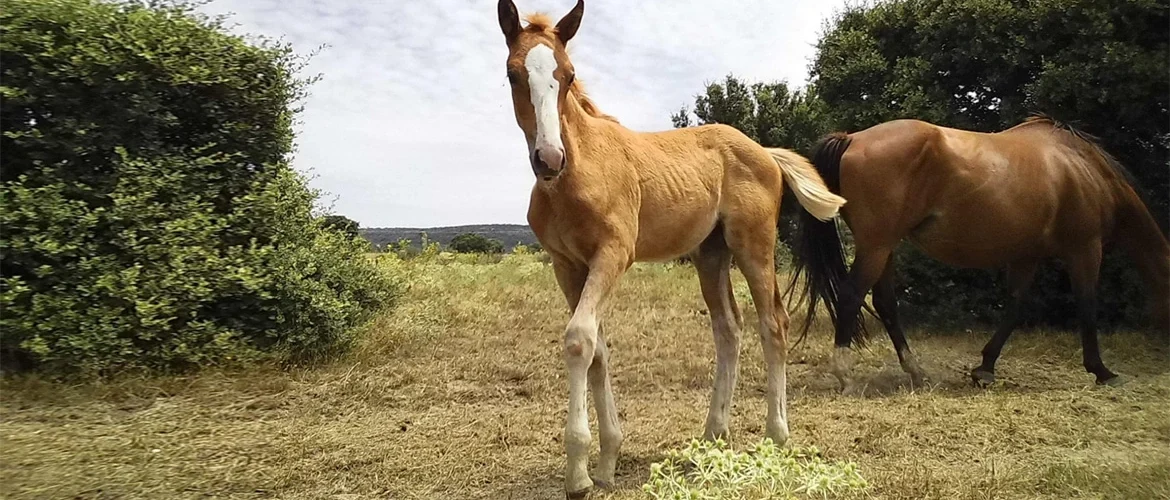The first six months of a foal’s life are crucial to ensuring good health and development throughout its life. During this period, foals experience rapid physical growth, develop their immune systems, and undergo significant changes in behavior and health. Below is an overview of the key points to consider:
– NUTRITION:
Maternal milk should be the primary source of nutrition for the foal during its first weeks of life. It contains all the nutrients needed for growth, development, and strengthening of its immune system. It’s essential to observe the foal during the first few hours after birth to ensure it consumes colostrum, the first milk produced by the mare, which is rich in nutrients, energy, and antibodies.
If the mare cannot provide enough milk, artificial milk supplementation may be used. This milk should be specifically formulated for foals and administered according to the veterinarian’s instructions. Overfeeding should be avoided, as it can cause digestive issues and musculoskeletal developmental problems.
From 2-3 weeks of age, the foal will start showing interest in other types of food, although maternal milk will remain its primary source of nutrition.
Between the fourth and sixth months of life, weaning usually occurs, although this depends on the breeder and, of course, the mare and foal. When this happens, high-quality hay should be offered to help the foal develop its digestive system. As the foal grows, feed, other types of forage, and nutritional supplements can be gradually introduced based on the recommendations of a veterinarian or equine nutritionist. The foundation of any horse’s diet is closely related to its individual needs. An eight-month-old foal does not eat the same type of feed as a twelve-year-old competition horse or a pregnant mare. The diet must be adapted to the horse’s needs in terms of food type, feeding method, and quantities.
– ENVIRONMENT:
Foals need a clean, safe, and suitable environment for their development. They should be raised in spacious areas, providing sufficient freedom and the company of other horses, where they can run, play, and develop their muscles.
This space should include an adequate shelter to protect the foal from cold, rain, and sun. The shelter should be large enough for the foal to enter and exit freely and should be located in a dry, well-ventilated area.
– VETERINARY CARE:
Regular veterinary care during the foal’s first months of life is essential. The veterinarian should conduct periodic check-ups to assess the foal’s health, deworm it, and administer vaccinations according to the recommended schedule.
Horses have a very delicate digestive system, and colic is one of the most feared conditions among horse enthusiasts. Although it cannot always be prevented, having a skilled veterinarian close by can help manage this condition effectively.
In the early stages of a horse’s life, following the guidelines of a competent veterinarian can prevent many future problems.
It’s important to constantly monitor the foal and report any changes in behavior, appetite, or health to the veterinarian. Common signs of illness include:
- Fever
- Diarrhea
- Loss of appetite
- Lethargy
- Difficulty breathing
- Irritability
– EXERCISE:
It is always advisable to allow the foal time to run and play freely. From 4-6 months of age, very light training sessions can begin, keeping in mind the foal’s age and development.
Excessive training or heavy work should be avoided, as it can harm its still-developing joints and bones.
In their natural habitat, foals and their mothers graze and gallop all day. It is the responsibility of the owners to provide a safe and friendly environment where the foal can thrive, staying active and enjoying life as much as possible.
It is important to note that a foal does not fully mature until approximately six years of age.
– SOCIALIZATION:
It is very important for foals to have the opportunity to interact with other horses from an early age, always being accompanied by them. This helps them develop proper social skills and avoid behavioral problems in the future.
Keeping a close eye on your foal during its first months of life is essential. Surround yourself with skilled professionals who can provide advice at all times.
We are committed to making your dream come true and helping you “create” your new foal. We will accompany you throughout the process, from OPU to the birth of your future champion. For more information, contact info@ovohorse.com or reach out via WhatsApp.



